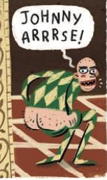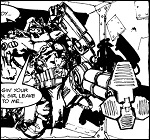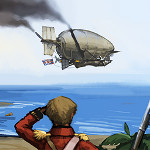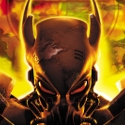|
Sage Genesis posted:This is what really gets me about 5e discussions. It's the big chandelier-swinging roleplay improv empowerment game, apparently, but as soon as someone tries to actually swing from that chandelier they always, always are being badwrong. Except if they cast Mordenkainen's Helpful Light Fixture because in that case they're being creative and possibly even overpowered. Back when the Wizards messageboards were still active, there was a thread where someone pointed out -- not negatively, just in a "huh that's interesting" way -- that a 20th-level elemental monk could use Water Whip to trip a dragon. It was immediately flooded by enraged posters declaring that was OBVIOUSLY a mistake and that no REAL DM could possibly allow a player to get away with shenanigans like that, even if the rules allowed it.
|
|
|
|

|
| # ? Jun 8, 2024 16:03 |
|
Selachian posted:Back when the Wizards messageboards were still active, there was a thread where someone pointed out -- not negatively, just in a "huh that's interesting" way -- that a 20th-level elemental monk could use Water Whip to trip a dragon. It was immediately flooded by enraged posters declaring that was OBVIOUSLY a mistake and that no REAL DM could possibly allow a player to get away with shenanigans like that, even if the rules allowed it. I'm not surprised. The Elemental Monk is just some scrub pretending to be a real Glorious Master Race spellcaster. I bet that if a level 20 Wizard casts Hold Monster to let a flying dragon fall down to the ground they have no problem with it, even though that's far more powerful than just tripping it.
|
|
|
|
God forbid fantastic heroes do some fantastic poo poo without wearing a pointy hat.
|
|
|
|
Last game I ran our Cleric let a brute zombie punch them in order to discharge a touch spell into it. Also in the christmas one-shot one of my players ascended to Godhood of Christmas Abominations by forcing a gaggle of eldritch abominations beyond the ken of men and the rules of time or space to HAIL SANTA! Since he had just killed Santa, and therefore assumed his role per the Santa Clause. Another player in that game won a fight against Santa's sleigh by revealing his explosive parentage. Granted, the game was more free-form than 5e really, I only really kept Advantage/Disadvantage and rolling for stats/race/class in order to create nonstandard characters that could be explained through wild backstories. Character creation in that game was all part of the general crazy fun.
|
|
|
|
Selachian posted:Back when the Wizards messageboards were still active, there was a thread where someone pointed out -- not negatively, just in a "huh that's interesting" way -- that a 20th-level elemental monk could use Water Whip to trip a dragon. It was immediately flooded by enraged posters declaring that was OBVIOUSLY a mistake and that no REAL DM could possibly allow a player to get away with shenanigans like that, even if the rules allowed it. Yeah, get that Last Airbender poo poo out of my D&D! Real Wizards only in this club! I can't see anything wrong with this!
|
|
|
|
Sage Genesis posted:This is what really gets me about 5e discussions. It's the big chandelier-swinging roleplay improv empowerment game, apparently, but as soon as someone tries to actually swing from that chandelier they always, always are being badwrong. Except if they cast Mordenkainen's Helpful Light Fixture because in that case they're being creative and possibly even overpowered. We encourage you to swing from the chandelier! Make an athletics check to jump to the chandelier, an acrobatics check to catch it, acrobatics to land properly, disadvantage on your attack roll, but I'll give you an extra... 1d8 damage if you hit? That sounds realistic.
|
|
|
|
Last time I played 5e we had one character have to make multiple survival checks to start a fire on a bush. My druid thought it was so funny that it took so long that after he was finished I cast produce flame and set fire to another bush, and we ended up starting a brush fire. Seriously though, one 0-level spell could do what took him at least 3-4 tries.
|
|
|
|
LFK posted:We encourage you to swing from the chandelier! Make an athletics check to jump to the chandelier, an acrobatics check to catch it, acrobatics to land properly, disadvantage on your attack roll, but I'll give you an extra... 1d8 damage if you hit? That sounds realistic. Yes, historically the only play in D&D that's actually rewarded is conservative, mathematically-most-likely-to-succeed play. The game generally has no mechanics whatsoever for stunting and a community that reacts with outrage to any suggestion that non-casters can do anything interesting, let alone heroic in the epic sense.
|
|
|
|
Werewhale posted:I thought they love 5th edition? I mean, the "Choosing an Edition" page mentions "oh, there's a low power cap" as 5e's only downside. loving Reddit. No mention of Basic, and "You can get it cheap at second-hand stores
|
|
|
|
Selachian posted:Back when the Wizards messageboards were still active, there was a thread where someone pointed out -- not negatively, just in a "huh that's interesting" way -- that a 20th-level elemental monk could use Water Whip to trip a dragon. It was immediately flooded by enraged posters declaring that was OBVIOUSLY a mistake and that no REAL DM could possibly allow a player to get away with shenanigans like that, even if the rules allowed it. Back when Penny Arcade was still doing the 4e D&D games, at one point, Wil Wheaton's character was unavailable, so he was playing a zombie NPC they had picked up, and realized one of his powers could prone, and used it on a hydra. Insert EN World screaming that it proved 4e was the anti-roleplaying non-RPG because "in no TRUE RPG would any player get away with proning a hydra just by hitting it with an attack!" Speaking of which there's a thread on ENWorld right now all about 5e combat being boring. Naturally, the two suggestions that come up again and again is "just stop being bored, it's your own fault, 5e doesn't have any flaws" and "just describe your basic attacks better."
|
|
|
|
moths posted:"You can get it cheap at second-hand stores I'm going to charitably assume that was referencing the fact that it's the "newest old version," so the books are still floating around.
|
|
|
|
Even though I appreciate balance, some of the best and most memorable moments of any RPG are those game-changing, perhaps even game-breaking ideas that a PC comes up with in the face of a challenge.
|
|
|
|
It's nice when opportunities for those moments aren't solely relegated to spellcasters, though.
|
|
|
|
Radio Talmudist posted:Even though I appreciate balance, some of the best and most memorable moments of any RPG are those game-changing, perhaps even game-breaking ideas that a PC comes up with in the face of a challenge. Well yes. This is what is known in the writing world as 'conflict', and it turns out boring stories are boring because they don't have enough of it. The problem is that in a story, agency is dictated by the writer. So while the writer determines the difficulty of the challenge she also decides on the level of agency the protagonist enjoys. In D&D, the DM controls the difficulty of the challenge but the player 'controls' (with help from the dice) the agency level of their avatar, primarily through char gen. That little parenthetical is really important though. A 'memorable moment' can quickly become a frustrating slide into failure especially when its stuff that, narratively, your character should know about. There was a game recently I was playing in, wherein I was a super sub-optimal warlock. My only claim to fame was being a massive history nerd (in-universe, I'm only a mild history nerd IRL). Most of the time I let myself be relegated to the background to engage in light RP with the other players. Then, some local lord asked us if we knew the tale of Somesuch McGuffin, a famous and lost relic. Well, I asked the DM if I did, indeed, know! I rolled a 1 on my History. Meanwhile, the Ranger, a low-int character from half a world away was like, 'bam, natural 20'. The point of this dull anecdote is to illustrate the disconnect between 'the character I want to play' and 'what happens at the table.' And this was just a knowing stuff roll. Imagine how much more frustrating it is when you're playing a Rogue and you manage to fumble your trap roll because the DM made you roll six times, one for each tumbler in the lock you're picking. Those scenes are tense, sure, and we remember them as tense scenes if we succeed, but otherwise it's just as dull. Asking players to roll a bunch of checks because you think one is just too easy and you're so tired of the Fighter just cake-walking through all of his Athletics rolls is not a good reason to ramp up the challenge - but that's precisely what a lot of DMs do, adding Disadvantage, quietly raising the stakes or the DC, or asking for successive, redundant rolls. That's not more 'challenging' and completely ignores the chance of failure that's already intrinsic in a basic roll - to say nothing of the fact that slapping your face against an RNG isn't really challenging!
|
|
|
|
That story is yet another reason for why skills, especially social ones, need to be totally rethought.
|
|
|
|
Radio Talmudist posted:Even though I appreciate balance, some of the best and most memorable moments of any RPG are those game-changing, perhaps even game-breaking ideas that a PC comes up with in the face of a challenge. So for D&D it's when you throw away the rules and improv something. I think that's mostly why I'm starting to sour on D&D at this point - I prefer systems that are more flexible, and when the system must be rigid, I prefer to have lots of options codified into the system. Mutants and Masterminds is a great example of a game where actions are restricted to a list of powers, but the game actively encourages creative use of powers, up to and including a codified mechanic that lets heroes and villains bend or break the rules to add tension and create cool comic book moments. I'd love to have played the Christmas one shot mentioned earlier, but the system used there was so far removed from the rigid class system of 5e that it's hard to call it D&D at that point.
|
|
|
|
mastershakeman posted:That story is yet another reason for why skills, especially social ones, need to be totally rethought. What games have good skill systems? Mostly I play D&D and some Call of Cthulhu, neither have great, even though CoC is basically nothing but skills.
|
|
|
|
mastershakeman posted:That story is yet another reason for why skills, especially social ones, need to be totally rethought. I like the way HeroQuest handles them:
There are four results from a die roll: Critical, Success, Failure, and Fumble. The degree of success is the difference between how well the hero and his opposition roll for their ability. A simple chart: code:Finding Your Way Complete Victory: You find a secret way or shortcut that lets you pass the way quickly and securely. Major Victory: You are very sure of your way, and get there quickly and without problems. Minor Victory: You know where you are going, and get there easily. Marginal Victory: You get there, but it takes awhile. Marginal Defeat: You thought you knew where you were going, but take a wrong turn. Minor Defeat: You went off track somehow. Major Defeat: You are utterly lost. Complete Defeat: You are lost, and in a dangerous place Social Conflict Complete Victory: You have driven your opponent from the company in disgrace. Major Victory: You have acutely embarrassed your opponent in front of his peers. Minor Victory: You made your opponent look foolish. Marginal Victory: You seem to be right, but it is debatable. Marginal Defeat: You are uncertain of your behavior. Minor Defeat: You embarrass yourself. Major Defeat: You are abashed and cannot look people in the eye. Your social standing is affected. Complete Defeat: You are mortified to the point of having to leave or do something drastic. Your social standing is affected permanently, and you may face exile, demotion, or punishment of some kind. In the context of this system, an ability is anything you can use to solve a problem. Whether it be equipment, social connections, money, trained skill, appearance, whatever you want.
|
|
|
|
Mendrian posted:Asking players to roll a bunch of checks because you think one is just too easy and you're so tired of the Fighter just cake-walking through all of his Athletics rolls is not a good reason to ramp up the challenge - but that's precisely what a lot of DMs do, adding Disadvantage, quietly raising the stakes or the DC, or asking for successive, redundant rolls. That's not more 'challenging' and completely ignores the chance of failure that's already intrinsic in a basic roll - to say nothing of the fact that slapping your face against an RNG isn't really challenging! Unless I've completely misunderstood something, an experienced (4th level), talented (top 10% in the ability score = 15 = +2), trained (+2 proficiency bonus from skill) PC fails at moderately (DC 15) difficult tasks half the time already.
|
|
|
|
Vanguard Warden posted:I've never understood the appeal of 'realistic' campaigns like that, where you try to make the PCs feel more like cavemen than heroes. I've never understood they these stories never end with "And then I started to horribly insult the retarded chucklefuck and stopped playing with this insane group forever". Why are you torturing yourselves with this poo poo?
|
|
|
|
Radio Talmudist posted:Even though I appreciate balance, some of the best and most memorable moments of any RPG are those game-changing, perhaps even game-breaking ideas that a PC comes up with in the face of a challenge. Dirk the Average posted:So for D&D it's when you throw away the rules and improv something. I think that's mostly why I'm starting to sour on D&D at this point - I prefer systems that are more flexible, and when the system must be rigid, I prefer to have lots of options codified into the system. OneThousandMonkeys posted:Yes, historically the only play in D&D that's actually rewarded is conservative, mathematically-most-likely-to-succeed play. The game generally has no mechanics whatsoever for stunting and a community that reacts with outrage to any suggestion that non-casters can do anything interesting, let alone heroic in the epic sense. Basically this. Sure, there are awesome memorable moments in RPGs where things just go right and a player had some great scheme and the spotlight shone down on them hard and etc etc, but that's literally not what D&D is built around, and indeed the only time that happens is when you ignore or break the rules. D&D combat was based on some naval sim game - melee fighting has all the grace and movement of two ship of the lines going broadsides and sitting there until one sinks. Because the actual combat and use of HP is so abstracted, it means any special movements cannot be as abstracted, which swiftly turns into them being lovely. There's a gigantic fear for stunting become the new at-will to replace "I attack," so of course non-"I attack" options are almost always unusably terrible and niche at best. There was a thing from I wanna say GURPS that gets dredged up a lot in these sorta conversations on other forums - "if throwing sand in an enemy's eyes was that effective, people would wield bags of sand instead of swords." But what it's missing is that combat is supposed to involve that poo poo already! Feints, distractions, bluffs, taking the upper hand, outmaneuvering - all of that is captured in "I Attack." So loving of course "I attack" is boring as sin, and all other choices are garbage. You took the entire combat minigame and boiled it into a single option. "I attack" may as well be renamed "I try to win." Then you add in D&D's past as a dungeon crawler game that it never got over, so now your choice is "succeed" or "lose and die and start over." The consequences of failure as almost always so high, and the gulf between effective action use and ineffective action use so wide, that of course you're always going to use the boring "I Attack" every chance. 5e makes this even loving worse by removing anything a non-spellcaster could do that isn't "I Attack." Even their special moves are just more "I Attack"s. The BATTLEMASTER FIGHTER says "I Attack, and uh, do some extra damage." The MIGHTY BARBARIAN says "I rage, giving my I Attack a bonus, and then I Attack." Even worse, when you do have an action that is better then "I Attack," you more or less just use that instead. The Monk x/day says "I Stun" instead of "I Attack," and that's the extent of things. They can have all the movement speed in the world, it's entirely meaningless when they're still spending their action saying "I Attack." So sure, there could be awesome memorable moments in the game, but that has gently caress-all to do with balance. If anything, the lack of balance is antithetical to it. "The wizard cast the right spell this one time and saved everyone" is cool maybe once. When it's the standard action of the wizard, it sure gets a whole lot loving less cool.
|
|
|
|
TheAwfulWaffle posted:What games have good skill systems? Seconding Kibner's recommendation of HeroQuest 2. My GMing has also been greatly informed by the GUMSHOE system. I'd say though that a "good skill system" can be papered over by good GMing principles when it comes to skill checks: 1. Some things, or even a lot of things, don't need to be rolled for if the character is mechanically established to be competent at it. You don't roll for History, you ask "who is specialized in History?" and you let that player spout lore (or you spout lore through them as a mouthpiece 2. Even when you do roll for things, it's not "do I succeed?", it's "how well do I succeed?". If you roll for History, the minimum amount of lore needed to advance the plot is always revealed - beating a high DC just means you get extra clues or extra leads. If you roll Acrobatics to jump away from an explosion, a low roll might mean the protagonist has to "jump with the shockwave" and scuffles their knees as they land, while a high roll might mean a slow swaggering walk away as they smoothly put on some sunglasses. Obviously there are cases where "escaping the explosion" has damaging stakes to it, but I'm trying to drive at the idea of "degrees of success" 3. You generally do not want to call for more than one roll to accomplish any single thing, because of how probabilities work. If it's hard, that's what the single DC of the single roll is already supposed to accomplished 4. Building on #3, single rolls don't always have to represent single actions. A single Survival check might represent an entire afternoon's worth of laying down traps. 5. This last point is personal preference, but I've always set DCs based on the need for dramatic impact, one might even say gamist sensibilities. The group doesn't need to roll to open a door until they're being chased down by an ogre and need to escape quickly. When they do, the DC is always going to be something challenging, even if physically speaking it's exactly the same as every other door they've encountered across the rest of the fortress. AlphaDog posted:Unless I've completely misunderstood something, an experienced (4th level), talented (top 10% in the ability score = 15 = +2), trained (+2 proficiency bonus from skill) PC fails at moderately (DC 15) difficult tasks half the time already. I've mentioned this before, but this is largely because there's nothing behind 5th edition's calculation of DCs besides "5 is a round number"
|
|
|
|
Libluini posted:I've never understood they these stories never end with "And then I started to horribly insult the retarded chucklefuck and stopped playing with this insane group forever". I thought it was implied.
|
|
|
|
ProfessorCirno posted:Basically this. Sure, there are awesome memorable moments in RPGs where things just go right and a player had some great scheme and the spotlight shone down on them hard and etc etc, but that's literally not what D&D is built around, and indeed the only time that happens is when you ignore or break the rules. D&D combat was based on some naval sim game - melee fighting has all the grace and movement of two ship of the lines going broadsides and sitting there until one sinks. Because the actual combat and use of HP is so abstracted, it means any special movements cannot be as abstracted, which swiftly turns into them being lovely. There's a gigantic fear for stunting become the new at-will to replace "I attack," so of course non-"I attack" options are almost always unusably terrible and niche at best. There was a thing from I wanna say GURPS that gets dredged up a lot in these sorta conversations on other forums - "if throwing sand in an enemy's eyes was that effective, people would wield bags of sand instead of swords." But what it's missing is that combat is supposed to involve that poo poo already! Feints, distractions, bluffs, taking the upper hand, outmaneuvering - all of that is captured in "I Attack." I'm probably just going to copy paste this every time someone asks why I think games should use fail forward mechanics.
|
|
|
|
gradenko_2000 posted:I've mentioned this before, but this is largely because there's nothing behind 5th edition's calculation of DCs besides "5 is a round number" Wow, I never even thought about this before right now. It looks stupid when you actually lay it out for a middle-of-the-road kinda character progression. (Ignoring "very easy" because a trained PC using their primary stat actually can't fail). Level 1 with 16 in ability score and the skill trained. +3 ability mod, +2 proficiency bonus. 1d20+5 Easy: 80%, Moderate 55%, Hard 30%, Very Hard 5%, Nearly Impossible 0% Level 5 with 16 in ability score and the skill trained +3 ability mod, +3 proficiency bonus. 1d20+6 Easy 85%, Moderate 60%, Hard 35%, Very Hard 10%, Nearly Impossible: 0% Level 10 with an 18 in the ability and the skill trained. +4 ability mod, +4 proficiency bonus. 1d20+8 Easy: 95%, Medium: 70%, Hard 45%, Very Hard 20%, Nearly Impossible: 0% Level 15 with 18 in the ability score and the skill trained +a bility mod, +5 proficiency bonus. 1d20+10 Easy: 100%, Moderate 80%, Hard 55%, Very Hard 30%, Nearly Impssible: 5% Level 20 with an 20 in the ability and the skill trained. +5 ability mod, +6 proficeincy bonus., 1d20+11 Easy: 100%, Moderate 85%, Hard 60%, Very Hard 35%, Nearly Impossible: 10% It's saying that someone who is amongst the best in the world at their specialty fails a Moderately difficult task in that specialty more often that once out of ten tries? They fail a Hard task in the specialty nearly half the time? Maybe it's intentional and you're only supposed to roll when under attack or something? Wait, nope, the DMG tells you "Consider imposing disadvantage when... Circumstances hinder success in some way". That's the same as "you need to roll athletics to climb up there and acrobatics to jump down safely". Your level 20 world class talented PC only has a 1/3 chance to do a moderately difficult task as soon as "circumstances hinder success". How, in this world, does anything at all get done? Elector_Nerdlingen fucked around with this message at 05:46 on Jan 8, 2016 |
|
|
|
AlphaDog posted:Wow, I never even thought about this before right now. It looks stupid when you actually lay it out for a middle-of-the-road kinda character progression. (Ignoring "very easy" because a trained PC using their primary stat actually can't fail). Yeah, they essentially just lifted the DC numbers from 3rd edition, where players got level + 3 to their trained skills, attribute bonuses were higher, and competence bonuses from magic items were both assumed and readily available. It, uh, doesn't work very well with flat math, as you just found out. It also primarily doesn't work because the d20 is so swingy compared to the numbers being used. It'd be much better if the system used 3d6 or something, but even then the DC numbers don't track with bonuses. To answer your question as to how things get done: Magic. Spellcasters just declare a thing done and it is, so they never have to interface with those mechanics.
|
|
|
|
I think those exact numbers would work fine if they were intended to only be used in adverse conditions, you were allowed to keep defending yourself (or whatever), and you only ever needed one roll to complete the task.
Elector_Nerdlingen fucked around with this message at 06:08 on Jan 8, 2016 |
|
|
|
Digging up the analysis I did earlier:gradenko_2000 posted:On a lark, I decided to try and build a DCs by level chart, since the ones provided don't really make sense beyond just "hey let's kick it up by 5 because 5 is a nice round number". Comparing this to 4th Edition, their definition of an Easy DC is "creatures that do not have training [nor a positive attribute modifier] in a particular skill. Such creatures have about a 65 percent chance of meeting an easy DC of their level". Sure enough, the level 1 Easy DC is 8, because it's a 65% chance to roll an 8 or better on a flat d20. It goes up to a DC 9 for levels 2 and 3, because by then it's a roll of a d20+halfLevelBonus and the HLB is +1. It then does up by another +1 for every succeeding level. A Moderate DC is "for creatures that have training in a particular skill as well as for creatures that don’t have training but do have a high score (18 or higher) in the skill’s key ability.". That's a either a d20+5 for being trained, or a d20+4 for having an 18 in the key attribute. Sure enough, a Moderate DC at level 1 is a 12, because you have a 65% chance of rolling a 12 or better on a d20+4. For 13th Age, the math is a little rougher: at the Adventurer tier, a Normal task is DC 15, a Hard task is DC 20 and a Ridiculously Hard Task is DC 25. Assuming you didn't have a positive attribute modifier for the check, and you're only level 1, and only your +1 Background skill applies, you'd have a 40% chance of rolling a 15 on a d20+2, but assuming you give the tasks to people whose appropriate wheelhouses it is to do such things, they can get as high as d20 + 1 level + 5 ability modifier + 5 background skill for an 85% chance of success. Even a Ridiculously Hard Task has a 30-40% chance of being doable if you hand the task of "lifting an entire tavern to check for undead underneath" to the 20 STR Barbarian with a +5 to "Ever Seen Guns Like These?" It's maybe not as rigorously math'ed out as 4th Edition, but it does make more sense, and especially since there's no "Easy" DC, just a Normal one and it gets Harder from there. AlphaDog posted:How, in this world, does anything at all get done? It's important to note that it's 3.5e that took a strictly simulationist view of things. That is, literally everything is a skill check, just most of them are so easy as to be auto-successes. Your character looking around the bar is taking a Spot check, except the DC is something like 1. We mock it in the Murphy's thread, but for what it's worth, it's one way to make sure that your DCs are always "appropriate". When you get to 4e/13A/5e, it's where they start talking about how skill checks as only being things that you'd ask a player to roll for, such that "Easy" checks aren't things that you can automatically pass. This changing definition is what can throw some people off if you think about it too hard: does the scale of Easy, Moderate and Hard DCs only cover the things that you'd ask a player to roll for, or does it include automatic passes and take 10s and take 20s? Like, the 5th Edition DMG mentions DCs as low as 5, but at the same time tells the DM to skip over explicit rolls for them and just assume that the player automatically passes, but at the same time, it's why the definition or perception of "Easy" as a descriptor can also be warped. If you can still fail at it, even 20% of the time, is it really easy? On the other hand, if you set it to be so low that you automatically succeed, why mention it at all? It's just another of those things that the game assumes you're going to paper-over at some point, either by just leaning on the DC scale of 10/15/20 because it's what the book says, or from drawing upon your (potentially non-existent) previous knowledge from older RPGs.
|
|
|
|
gradenko_2000 posted:Like, the 5th Edition DMG mentions DCs as low as 5, but at the same time tells the DM to skip over explicit rolls for them and just assume that the player automatically passes, but at the same time, it's why the definition or perception of "Easy" as a descriptor can also be warped. If you can still fail at it, even 20% of the time, is it really easy? On the other hand, if you set it to be so low that you automatically succeed, why mention it at all? This is the part that was bothering me when I said "how does anything get done?". You have to be a god amongst men to get a moderately difficult task up to 85% likely to succeed. It's like it was written to work out about right if you assume the person attempting it is fighting off orcs with their spare hand. If the person who is as good as they can possibly be is failing 3 times out of 20, it's not "moderately difficult", it's really loving hard. Elector_Nerdlingen fucked around with this message at 06:58 on Jan 8, 2016 |
|
|
|
I'm not really keen on criticizing 5e's skill system from that angle, since a lot of games break down if you assume that any given action is a skill check, rather than "a trigger for dramatic conflict" It's a far larger problem IMO that even if you were to treat skill checks as the latter, the DCs are still completely out of whack, the roll modifier scaling is out of whack, and the swingy d20 coupled with the low roll modifiers, coupled with the lack of a baseline "expend effort/resources" mechanic means quantity is almost always better than quality.
|
|
|
|
I think what's more relevant is, why do we have all of these DCs in the first place if the output is, 'a skilled character will fail more than half the time'? From a certain perspective, unlikely is just unlikely. "It's almost impossible to know this obscure detail!" or "it's almost impossible to move a boulder!" are just dumb metrics, frankly. I think a lot of it is predicated on the idea that players can just attempt stuff even if it's absurd, which kind of makes sense. "I want to attempt this nearly impossible thing". "Okay, you fail, nothing happens." In a good skill system, something is always risked and some measure of forward momentum is attained, even if the thing risked is lost.
|
|
|
|
I found Angry GM's advice most useful. Only roll a skill check when there is 1) a possibility of success, 2) a possibility of failure, and 3) there is a cost to failure. While Angry GM has taught me a lot more about being a good GM than the DMG, I'd like more good authors to read. Does this thread have any reading recommendations for newish GMs?
|
|
|
|
Sergeant Nerd will do you good. Not a lot of meat on it yet, but the stuff there is decent.
|
|
|
|
While speaking on probabilities, how would Easy/Moderate/Hard/Impossible DCs work out for a 3d6 system? I've been thinking of converting my pseudo-D&D system to use it but I can't quite grok the probability curves for dice.
|
|
|
|
Ambi posted:While speaking on probabilities, how would Easy/Moderate/Hard/Impossible DCs work out for a 3d6 system? I've been thinking of converting my pseudo-D&D system to use it but I can't quite grok the probability curves for dice. Let's start with a d20 Take a flat d20 roll, no modifiers, versus a target number of 10. The d20 will roll higher than 10, 50% of the time. Now, D&D since time immemorial has used the "meet or beat"/"equal or better" clause, such that a DC of 10 is actually a 55% chance to succeed, so a true 50% chance would be d20 vs DC 11 For every +1, the chance to succeed improves by 5% For every 1 DC higher than 11, the chance to succeed worsens by 5% d20+1 vs DC 12 is effectively the same as d20 vs DC 11. These are both the same as d20+5 vs DC 16 These are all the same as d20+25 vs DC 36 All of these are a 50% chance to meet or beat the DC and therefore succeed For 3d6, the baseline is the same: a 3d6 will have a 50% chance to roll an 11 or better What changes is how much better your chances get as you exceed this baseline, or how much worse your chances get when you're below the baseline 3d6+1 vs DC 11 = 62.50% chance to succeed (55% if it was d20+1) 3d6+2 vs DC 11 = 74.07% chance to succeed (60% if it was d20+2) 3d6+3 vs DC 11 = 83.80% chance to succeed (65% if it was d20+3) 3d6+4 vs DC 11 = 90.74% chance to succeed (70% if it was d20+4) If, on the other hand, your +roll modifiers aren't as strong as the "DC excess over 11", then your chances to succeed are reciprocally much worse than if you were using d20s Basically, if you drift more than 4 points away from the baseline, then you're looking at a near-guaranteed success or a near-guaranteed failure.
|
|
|
|
This discussion is making me considering buying the 13th age handbook to see how it compares to 5e. I'm enjoying my time with 5e but I'm curious if 13th age will give me more of what I want.
|
|
|
|
Soylent Pudding posted:I found Angry GM's advice most useful. Only roll a skill check when there is 1) a possibility of success, 2) a possibility of failure, and 3) there is a cost to failure. Seconding Sergeant Nerd as being good, and it's by goon forum poster JackMann This series of articles by goon forum poster neonchameleon also helped me immensely when I was just getting my feet wet on GMing: Three Strikes Plans and Races against Time Fast and interesting battles Sandboxes and Adventures - World Building The Theater of the Mind For books: D&D 4th Edition Dungeon Master's Guide 2 Robin's Laws of Good Gamemastering Hamlet's Hitpoints (basically anything by Ken Hite / Robin D Laws) The Risus Companion by S. John Ross The Lazy Dungeon Master Guide by Sly Flourish Play Unsafe by Graham Walmsley
|
|
|
|
Radio Talmudist posted:This discussion is making me considering buying the 13th age handbook to see how it compares to 5e. I'm enjoying my time with 5e but I'm curious if 13th age will give me more of what I want. I'd definitely give it a look. My experience with the way 5e is actually played across my own game and several of my friends' is that it plays much like a less structured, less interesting version of 13th Age.
|
|
|
|
13A is great if you want a new-school system that values balance at the table, but still don't expect any interesting world-building. With that you're really on your own. I don't think there's a lot going on in the game as far as classes and items--I couldn't imagine playing many of the classes more than once and getting a much different experience--but it's a sound game.
|
|
|
|

|
| # ? Jun 8, 2024 16:03 |
|
I assume you mean an established world - There 's a ton of collaborative world-building baked into the system. This is really emphasized in the organized play, but one of your character's traits is literally your One Unique Thing. As in, at character creation you can make everybody except you colorblind. Or be the last Dwarf on the planet.
|
|
|

































